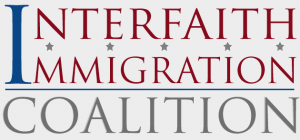FAITH4CITIZENSHIP
Breaking Bread & Building Bridges
A campaign to strengthen the movement for just and humane immigration reform
Strategy
Breaking Bread and Building Bridges is part of a larger strategy to lift the voices of faith communities at the local level and turn the tide for immigrants’ rights. Local events such as potlucks, vigils, and detention visitation connect advocates with those most directly affected by unjust immigration policies. The relationships that are nourished serve to build understanding and strengthen dedication for continued work toward just and humane immigration reform.
The post-election reality in 2012 ushered in a significant shift in the narrative for humane immigration reform. Grassroots involvement, including in-district meetings with members of Congress and public, prayerful witness will be critical to any national reforms. At the same time, it will be essential to continue to push for local and state policies that build welcoming communities and stop deportations.
This toolkit provides resources for congregations to engage in activities such as potlucks, vigils, and meetings with decision makers to make progress toward achieving these goals. The type of campaigns you create/join will depend on your local context, existing relationships, and passions.
Goal: To create and strengthen relationships of solidarity among people of faith, impacted communities, and immigrants’ rights groups to effectively organize and advocate for just immigration policies.
Activities and Actions
(Timelines are flexible according to each denomination/ organizations priorities)
Host a Breaking Bread and Building Bridges Event. Breaking bread is a common ritual across cultures and traditions used to build and strengthen relationships. At the heart of organizing for social change is the importance of building relationships and inviting more people to be part of shared goals. Eat, meet and organize for immigrants’ rights!
- Form a planning committee and meet with key leaders in your congregation
- Reach out to other congregations, including those of other faiths, local immigrants’ rights groups and worker centers, service providers or detention ministries and invite them to attend your event
- Host a Breaking Bread Event January- March
- Share family migration stories: share your story and listen to the stories of others
- Identify common values and goals
- Strategize together and map out an action plan to win immigrants’ rights
Host a Family Unity Prayer Vigil to highlight the need for local, state and national reforms to reunite and keep families together. Be strategic about your actions and identify what makes most sense for you in your region and community. Some examples include:
- Push for compassionate and humane immigration reform: Host an interfaith prayer vigil outside the local office of your senators and/or representatives, calling for immigration reform that prioritizes family unity.
- Join Restoring TRUST Campaigns at the city, county or state level to resist ICE’s harmful enforcement program known as “Secure Communities” or S-Comm. A prayer vigil can include stories of families torn apart by S-Comm and call for local officials to stop honoring ICE holds, which will help keep families together and keep communities safe.
- Stop state-led Arizona styled anti-immigrant bills: Join campaigns in Kansas, Virginia, Mississippi, Arkansas, and elsewhere. Prayer vigils can take place outside of state capitol buildings to highlight the opposition to anti-immigrant state legislation.
- Work toward the passage of pro-immigrant bills, such as the equitable/ in-state tuition for DREAM Act youth at the state level. Prayer vigils can include the stories of DREAM Act youth and others who would be helped by these pro-immigrant bills.
Organize local delegations to meet with your senators and representatives and/or their staff, at their local offices. . By linking local congressional visits with DC-based visits, we can send a strong message that people of faith care about immigrants’ rights.
- Set up meetings with strategic decision makers and coordinate a delegation of faith leaders and/or service providers to meet with influential politicians on your campaign.
- Coordinate with IIC advocates in DC so we can compare notes on the visits and identify next steps in ensuring their support for humane immigration reform.
- Join and organize local actions such as marches, rallies and press conferences.
Continued Activity and Involvement
Connect with local service initiatives. Find ways in which to work together through service initiatives such as detention ministry, legal clinics or refugee settlement volunteer work. Develop relationships of solidarity. Even if humane immigration reform is enacted, there will still be much work to do to bring communities together and ensure equal rights for all. Be part of joining advocacy efforts to service work!
- Participate or organize a detention visitation program. Connect with interfaith and ecumenical groups who have established programs in your region. Many long-term detentions of immigrants who may not have family in the region Detention visitation – LIRS Visitation resources with toolkit, Advocacy resources from Detention Watch Network
- Connect with a local refugee resettlement agency to see how you can volunteer or become a sponsoring congregation.
- Bring advocacy to service work by working to change immigration enforcement policies locally, advance immigration reform, and preserve funding for refugee programs.
